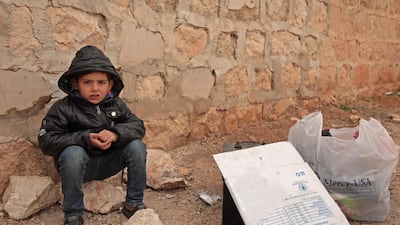UN investigators have called for thousands of children of foreign ISIS members to be repatriated from Syria, criticising governments for trying to separate young people from their mothers.
In a report published on Thursday, the UN Independent International Commission of Inquiry on Syria highlighted the plight of the children of ISIS members, with youths being held in detention centres.
"This, in turn, jeopardises their rights to a nationality, hinders family reunification processes and puts them at a higher risk of exploitation and abuse," the report said, recommending that governments recognise papers issued by groups such as ISIS to allow children to obtain official documents.
The UN estimates that there are around 28,000 children of foreign fighters living in Syrian camps, with the majority of them from Iraq.
The findings of the inquiry came amid reports that European governments were seeking to separate children of ISIS fighters from their parents.
ITV News reported that ISIS member Mehak Aslam, who went to Syria in 2014 with her husband Shahan Choudhury, had been asked to sign paperwork that would allow her four children to return to the UK from Syria on the condition that she does not come with them.
Ms Aslam’s father, who has urged his daughter to sign the papers, said his eldest granddaughter had been killed in an explosion in Baghouz, Syria and he feared for his other grandchildren’s safety.
“I can never forgive them for that,” Mohammed Aslam told the broadcaster. “They wanted to take this step for themselves. That’s fine, that’s their problem, but why involve the kids in this?”
The Guardian reported that the Kurdish authorities responsible for the camp where Ms Aslam and her children are being held would reject any British attempt to repatriate the children without their mother.
The British Foreign Office said it did not comment on individual cases.
“Every request for consular assistance is considered on a case by case basis. Decisions take into account all relevant considerations including nationality, national security and feasibility,” a foreign office representative said.
Ms Aslam and her husband were stripped of their British citizenship by the UK government, a move condemned by UN investigators.
The UN report said stripping parents of their citizenship had a negative impact on children and on “their ability to exercise basic human rights”.
"States have well-defined obligations to protect children, including from statelessness. Failing to abide by such fundamental principles would be a clear derogation of duty," UN commissioner Hanny Megally said.
Separating children from their parents would be against the “best interests of the child", the inquiry found.
The report also accused both the Syrian government led by President Bashar Al Assad and extremists from non-state actors such as ISIS of committing human rights abuses against children, including murder, rape and torture.


